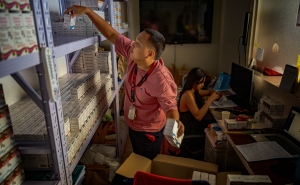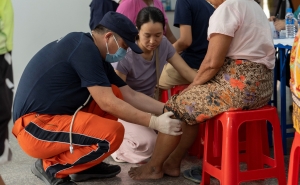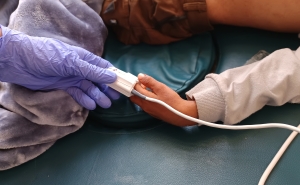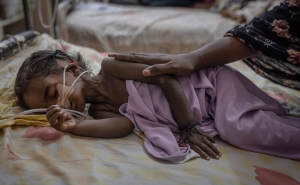New Leadership Training Program Will Enhance Health Systems Strengthening in Uttar Pradesh, India
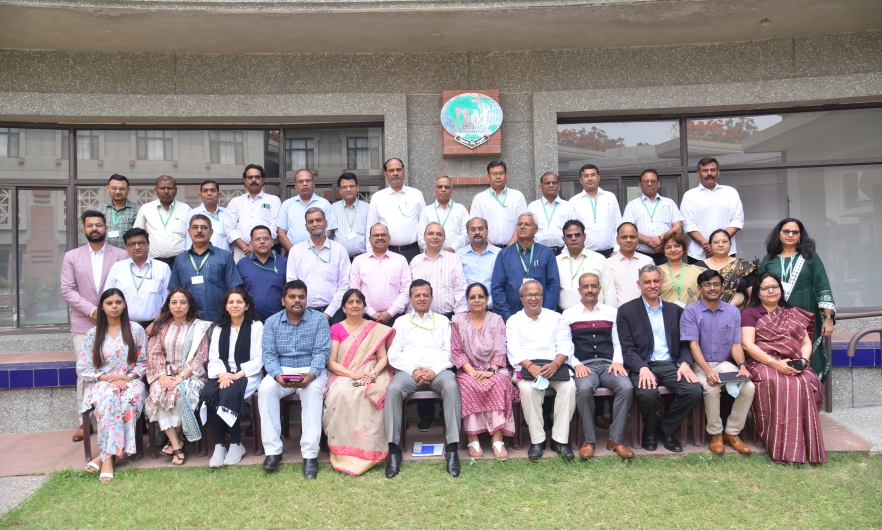
Researchers at the Johns Hopkins Bloomberg School of Public Health have supported partners in India with the launch of a first-of-its-kind leadership program for medical officers who manage and implement public health programs in the state of Uttar Pradesh. The training, called, the Leadership and Management Training Program, is aimed at mid-level medical officers and will equip them with leadership and management skills in their current roles and as they take on additional managerial roles.
The Leadership and Management Training Program is offered by the Uttar Pradesh State Institute of Health and Family Welfare (SIHFW) with support from the Bloomberg School and the Indian Institute of Management Lucknow (IIML). Brian Wahl, PhD ’17, MPH ’13, associate research professor in the Department of International Health at the Bloomberg School, is leading the Johns Hopkins team working on the project. The leadership training is a component of the Johns Hopkins Uttar Pradesh Health Systems Strengthening Support Project (HSSSP), which is funded by the Bill & Melinda Gates Foundation and provides technical support and capacity building in health systems strengthening and analytics to organizations working in Uttar Pradesh.
While the state has made significant progress in addressing health challenges in recent years, Uttar Pradesh continues to grapple with high burdens of communicable, maternal, neonatal, and nutritional diseases, which remain higher in UP than in many other states in India. In addition, a majority of the population lives in rural areas, creating an additional challenge for UP’s health system in reaching the entire population. The Leadership and Management Training Program represents an important step by the Government of Uttar Pradesh to provide medical officers with skills that will be key to their role in enhancing the Uttar Pradesh health system.
The Leadership and Management Training Program is conducted in three phases. Phase 1 includes a six-day, in-person training session for government-nominated medical officers, followed by phase 2, a three-month mentored leadership program in which medical officers work on a project with mentors from IIML, SIHFW, and the Bloomberg School. The inaugural training program launched in April 2023 and recently concluded the first mentorship session, training a total of 26 participants. In the third phase, participants return to share their experiences in addressing a significant public health problem through their projects.
The participants developed competencies in systems thinking, problem-solving, leadership, and effective communications during the phase 1 in-person training, where they also learned how to develop and lead high-performing teams and organizations. During this time, medical officers identified health challenges in Uttar Pradesh that they would address through work on their project in the mentorship phase.
After completion of the in-person training, medical officers began phase 2, where they focused on developing practical leadership and management skills through work on the health challenge they identified in phase 1, working alongside their mentors. The aim of phase 2 is to develop a cohort of inspiring leaders who can address and advocate for changes in Uttar Pradesh’s health system, as well as identify and innovate strategies in the face of evolving public health situations.
The Leadership and Management Program represents the first training in leadership and management for medical officers provided in Uttar Pradesh. “Hopkins is thrilled to support this important training for the health workforce in the state. This represents an important investment in time and resources by the Government of Uttar Pradesh toward strengthening its health system and improving the health of its population,” says Wahl.
Once the Leadership and Management Program concludes, there will be an evaluation of the program to ascertain its success in developing emerging leaders, with the ultimate aim of transferring it over completely to local organizations in Uttar Pradesh to ensure the sustainability of the program.
In addition to Wahl, other key Hopkins personnel working on the leadership training include Sara Bennett, PhD, professor, Cyrus Engineer, DrPH ’07, MHS ’03, MHSA, professor of the practice, Krishna Rao, PhD ’04, MSc, associate professor, from the Department of International Health, and Aman Mohan Mishra, team lead in public health management and leadership, Shalini Singh, senior researcher, Sana Ali, program coordinator, and Swati Srivastava, senior program support officer from the HSSSP.


